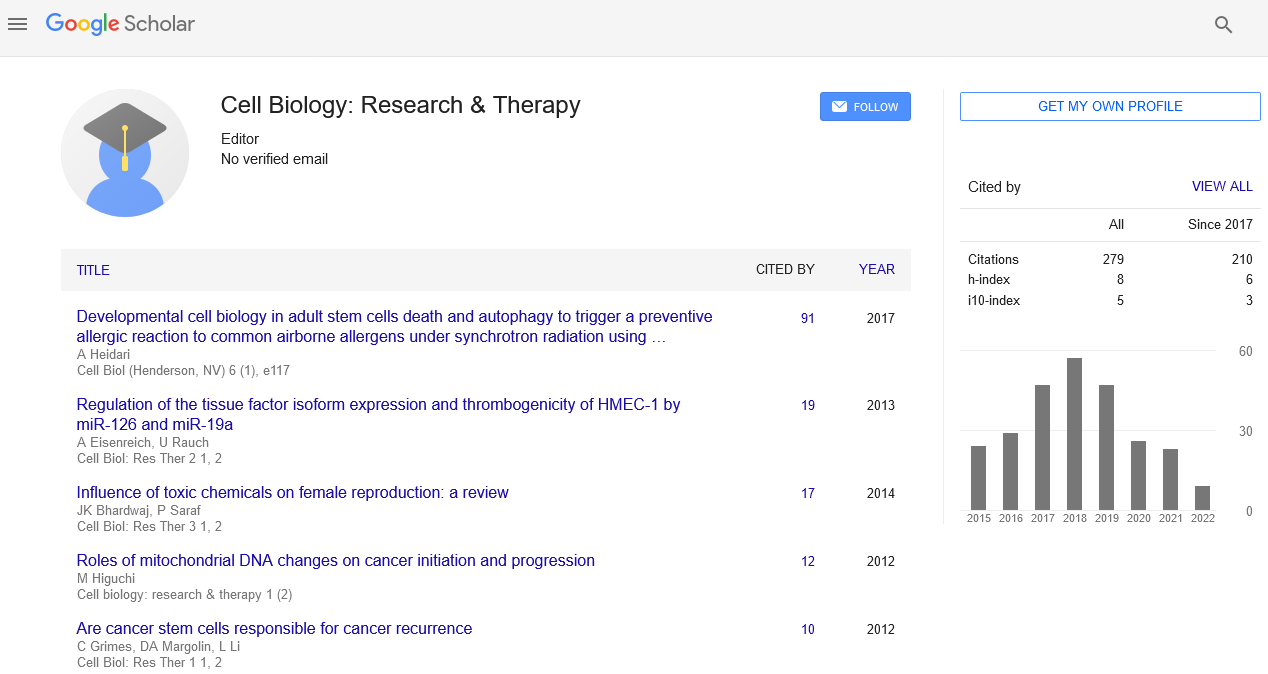Perspective, Cell Biol Vol: 12 Issue: 2
The Role of Chemokines: Small Group of Proteins in Immune System
Timothy Saffery*
1Department of Immunology, Zhongshan University, Guangzhou, China
*Corresponding Author: Timothy Saffery,
Department of Immunology, Zhongshan University, Guangzhou, China
E-mail: saffery@timothy.cn
Received date: 24 May, 2023, Manuscript No. CBRT-23-105067;
Editor assigned date: 26 May, 2023, PreQC No. CBRT-23-105067 (PQ);
Reviewed date: 09 June, 2023, QC No. CBRT-23-105067;
Revised date: 16 June, 2023, Manuscript No. CBRT-23-105067 (R);
Published date: 23 June, 2023 DOI: 10.4172/2324-9293.1000184
Citation: Saffery T (2023) The Role of Chemokines: Small Group of Proteins in Immune System. Cell Biol 12:2.
Description
Chemokines are a diverse group of small proteins that play a crucial role in guiding immune cell migration and coordinating immune responses. These signaling molecules act as chemotactic agents, directing immune cells to specific tissues and sites of inflammation. This study will explore the functions, classifications, and significance of chemokines in immune responses, inflammation, and beyond.
Functions of chemokines
Chemokines orchestrate immune cell trafficking and positioning, ensuring the proper mobilization of immune cells to infection sites and sites of tissue damage. They play a pivotal role in leukocyte recruitment, activation, and the formation of immune cell clusters. By attracting immune cells, chemokines help to establish an effective immune response and promote the clearance of pathogens or damaged cells.
Chemokine classification and receptors
Chemokines are classified into four main subfamilies based on the arrangement of their conserved cysteine residues which includes C, CC, CXC, and CX3C. The naming convention reflects the positioning of the cysteine residues in the amino acid sequence. Chemokines exert their functions by binding to specific G Protein-Coupled Receptors (GPCRs) expressed on the surface of target cells. The interaction between chemokines and their receptors triggers intracellular signaling pathways that regulate cell migration, adhesion, and activation.
Role of chemokines in inflammation
Inflammation is a fundamental response to tissue injury or infection. Chemokines play a pivotal role in regulating the inflammatory process by recruiting immune cells to the site of inflammation. They facilitate the extravasation of immune cells from blood vessels into tissues, allowing them to target the affected area. Through their chemotactic properties, chemokines promote the recruitment of neutrophils, monocytes, and other immune cells to initiate the inflammatory response.
Chemokines in homeostasis and development
Beyond their roles in inflammation, chemokines also contribute to tissue homeostasis and development. In healthy tissues, chemokines help maintain the appropriate distribution and positioning of immune cells, ensuring a balanced immune response. During development, chemokines guide the migration of immune cells to specific anatomical sites and assist in the formation of lymphoid organs and immune cell compartments.
Implications of chemokines in disease
Dysregulation of chemokines and their receptors can lead to pathological conditions. Altered chemokine expression or receptor signaling is associated with chronic inflammatory diseases, autoimmune disorders, and cancer. Aberrant chemokine production can contribute to the recruitment and accumulation of immune cells in diseased tissues, promoting tissue damage and exacerbating inflammatory responses.
Therapeutic potential of targeting chemokines
The significant role of chemokines in immune responses and disease pathogenesis, targeting chemokines and their receptors has emerged as a potential therapeutic strategy. Modulating chemokine signaling can influence immune cell migration, alter the inflammatory response, and impact disease outcomes. The development of chemokine receptor antagonists or monoclonal antibodies targeting specific chemokines holds promise in treating inflammatory disorders, autoimmune diseases, and certain types of cancer.
Conclusion
Chemokines serve as vital regulators of immune cell migration and immune responses, playing a pivotal role in inflammation, tissue homeostasis, and development. Their diverse functions and interactions with specific receptors enable the precise coordination of immune cell trafficking and positioning. Dysregulation of chemokines can contribute to the pathogenesis of inflammatory diseases, autoimmune disorders, and cancer.
The study of chemokines opens up exciting possibilities for therapeutic interventions. Targeting chemokines and their receptors holds promise in modulating immune responses, mitigating inflammation, and treating various diseases. As research continues, further insights into chemokine signaling, receptor specificity, and the role of chemokines in disease pathogenesis will emerge. Such knowledge will contribute to the development of novel therapeutic strategies and personalized medicine approaches, providing new avenues to combat immune-related disorders and enhance immune responses against pathogens.
 Spanish
Spanish  Chinese
Chinese  Russian
Russian  German
German  French
French  Japanese
Japanese  Portuguese
Portuguese  Hindi
Hindi 